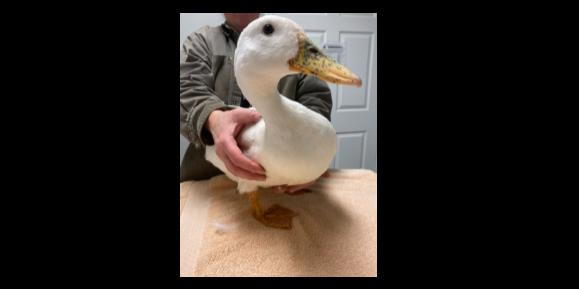
Caring for Pet Ducks
The most important things to know about caring for ducks are their environmental requirements as well as the appropriate diet to feed at what age/life stage. Without providing adequate space and the appropriate diet, ducks can develop diseases that are life threatening.
ENVIRONMENT
Waterfowl require a lot of space! They spend a lot of their time in the water (pond, lake, kiddie pool) but also like to rest on land. Their area on land should be a clean, dry sheltered area where they can rest, clean, and preen their feathers. This area should consistent of soft substrate so they do not develop sores on their feet. The substrate may include grass, soil, wood chips/shavings, or anything that provides cushioning. Ducklings should be housed in a temperature controlled environment with heat provided.
Waterfowl must be able to regularly swim in order to maintain their waterproofing. It also provides exercise, enrichment, and sometimes another source of food. If your duck is being separated for medical reasons, you must offer a source of water for the patient to swim in or use a water bottle to heavily mist the bird at least twice daily to promote self-preening and maintenance of water-proofing. The duck would ideally be able to completely submerge its head and entire length of its neck in the water container. Ducks also drink water to help moisten the dry food they eat to aid in digestion.
Waterfowl are very messy! Enclosures should be cleaned at least once daily. If the pet is confined for medical reasons, rubber mats or grates will help keep the enclosure relatively clean and dry.
DIET
Good nutrition is crucial to keeping your ducks healthy. A duck’s diet completely depends on their life stage and activity level. Please select a commercial waterfowl feed that is appropriate for your duck. Reputable manufacturers include Purina, Mazuri, or Gunter. Buy small quantities of food to ensure it stays fresh and so the vitamins in the food do not degrade over time. The food should be stored in a tightly sealed plastic container that is kept in a cool, dry location. A shallow food container should be used to allow your duck to shovel food into its bill, using a scooping motion of the head/neck.
Life Stage | Recommended Feed | Protein Level (%) |
1 day to 4 weeks old | Starter diet | 20 |
4 wks to flight stage 13 wks | Grower/finisher diet | 16 |
Adult | 1:1 maintenance diet with scratch grains | 14 |
Egg-laying adults | Breeder/Layer diet | 17 |
Molting adults | 2:1 mixture of Starter:Breeder diets | 20 |
Treats should be given in small amounts. Foods like corn, carrots, and greens do not meet all of the nutritional requirements for your duck and should not compromise more than 5-10% of the diet. Allowing your duck to graze in the yard is fine as long as it is pesticide free.
If your ducks have access to dirt, it does not need supplemental grit. If they do not have access to dirt, please sprinkle a small amount of grit on their food once a week.
Laying ducks do not need supplements or oyster shell added if they are already on a good quality laying ration. Do not feed oyster shell to non-laying ducks or drakes as this can lead to kidney disease from too much calcium in the diet. Do not offer medicated feeds designed for other species, as these can be toxic to ducks.
HEALTH AND DISEASE
It is important to put eyes on all of your ducks every morning and night. Frequent observation will help you pick up on abnormalities sooner. It is recommended to pick up each duck and ruffle through their feathers at least once weekly. Feeling for their weight, body condition, looking for ectoparasites, limping, etc. will help assess for disease. Also monitoring their droppings and food intake are good indicators of health.

